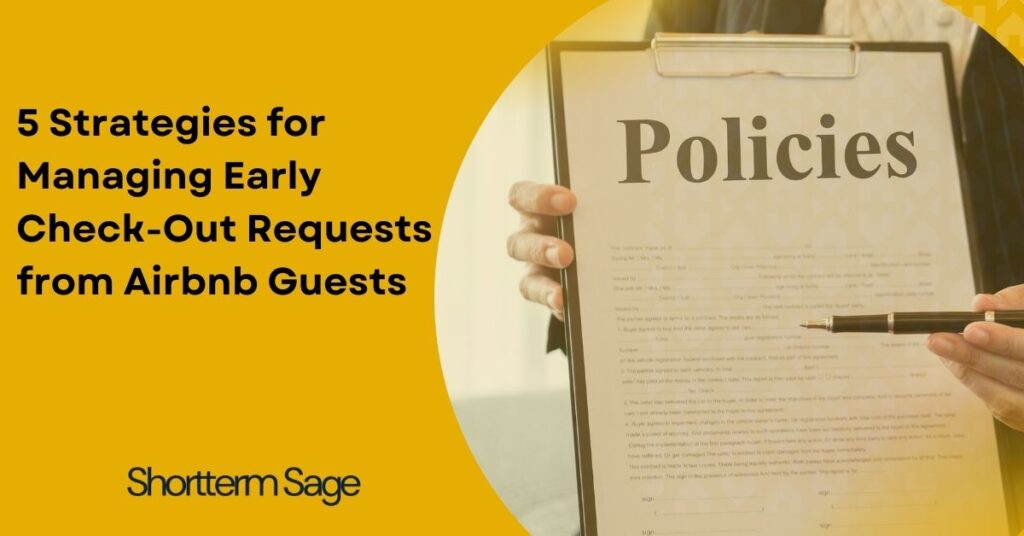
When a guest checks into your Airbnb and suddenly wants to shorten their stay, it can create a whirlwind of emotions and uncertainty. Such situations can arise for various reasons, including personal preferences, unexpected issues, or simply a change of heart. It’s essential to approach these scenarios with a level head and a clear understanding of the dynamics at play.
As a host, it’s crucial to remember that your guests may have valid concerns. They might be dissatisfied with the property, the location, or even the amenities provided. Therefore, your first step should be to engage with them and get to the root of the issue. This can help you address their concerns and potentially salvage their stay.
Open lines of communication are vital when guests express a desire to shorten their stay. When faced with such a situation, reach out to your guests promptly. Ask them directly about their concerns and listen attentively to their responses. This not only shows that you care but can also provide insights into what may have gone wrong.
For instance, if a guest claims there’s no hot water or that the house is too cold, take immediate action. Check the thermostat or water heater and adjust it if necessary. Transparency is key; if you can resolve their issues quickly, they may reconsider their decision to leave.
Understanding Airbnb’s cancellation policies is crucial for both you and your guests. If a guest wants to shorten their stay, the cancellation policy you have in place will dictate how much they are entitled to refund-wise. There are different policies available, including moderate and strict, which can significantly affect the outcome of a last-minute cancellation.
For example, if your cancellation policy is moderate, guests may receive a partial refund based on the days they didn’t stay. In one case, a guest who booked a 27-day stay canceled after only two days received a refund for the remaining days. Being aware of these policies can help you communicate expectations clearly to your guests.
One of the most challenging aspects of handling early departures is the potential impact on your ratings and reviews. Guests who leave early may still leave feedback that could affect your overall score. To mitigate this, consider how and when you leave reviews for your guests.
One effective strategy is to delay posting your review until after the guest has left. This gives you a chance to secure a new booking before they can see any feedback you leave. Remember, even if a guest leaves a negative review, it’s often more about their personal experience than a reflection of your hosting abilities.
After navigating the complexities of a guest wanting to shorten their stay, it’s vital to focus on future bookings. Once the situation is resolved, take the opportunity to open your calendar for new guests. This can help minimize the financial impact of a last-minute cancellation.
Additionally, reflecting on the experience can provide valuable lessons for future bookings. Consider what could be improved in your listing or communication style to prevent similar situations. Whether it’s enhancing your property description, improving amenities, or providing better local recommendations, continuous improvement is key.
In conclusion, dealing with guests who want to shorten their stay is an inevitable part of being an Airbnb host. By understanding the situation, communicating effectively, navigating policies, managing expectations, and preparing for future bookings, you can turn a potentially negative experience into a learning opportunity. Remember, every guest interaction is a chance to grow and enhance your hosting skills.
Our reviews are made by a team of experts before being written and come from real-world experience. Read our editorial process here.
Some of the links in this article may be affiliate links, which can provide compensation to us at no cost to you if you decide to purchase a paid plan. These are products we’ve personally used and stand behind. This site is not intended to provide financial advice. You can read our affiliate disclosure in our privacy policy.
About the author:
This website is operated and maintained by Short Term Sage LLC. Use of the website is governed by its Terms Of Service and Privacy Policy.
Short Term Sage LLC may link to content or refer to content and/or services created by or provided by third parties that are not affiliated with Short Term Sage LLC. Short Term Sage LLC is not responsible for such content and does not endorse or approve it.
We use cookies to help improve, promote and protect our services. By continuing to use this site, you agree to our privacy policy and terms of use.